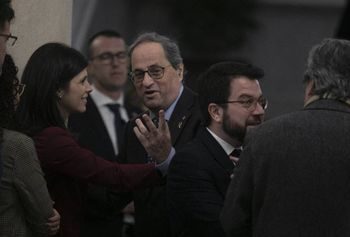
The day that Francisco Nicolás Gómez-Iglesias, whom the Spanish media have dubbed “El Pequeño Nicolás” (or, Little Nicolás), really saw the writing on the wall, he was sitting outside a Madrid provincial courtroom.
The 25-year-old was looking wild-eyed, sweaty and nervous, and his lawyer had to ask a court employee for assistance to calm him down. Ultimately, the hearing was postponed after Gómez-Iglesias’ lawyer refused to defend him, citing “indirect pressure” from unspecified sources.
His defense claimed that he suffers from a narcissistic personality disorder
It was May 20, and El Pequeño Nicolás had just walked away from a trial that could send him to prison for seven years for posing as an envoy of King Felipe VI and setting up a meeting with the head of Alsa, a bus-services company. Before traveling to an agreed location in Ribadeo (Lugo), the young man contacted the local authorities, who prepared a welcome committee for the “royal envoy.”
“I feel sad,” said the young man after racing out of the courthouse in May. The decision to postpone the trial to this coming spring has bought him some extra time, but 2020 promises to be a tough year for him on the judicial front.
Investigators have long considered El Pequeño Nicolás as a classic case of a conman. The Spanish media had a field day after it emerged that Gómez-Iglesias had established a high-flying lifestyle and had been fostering top-level connections, publishing photographs that show him shaking hands with King Felipe VI after attending his coronation, as well as with senior members of the conservative Popular Party (PP), among them former Prime Minister José María Aznar and his wife, the one-time mayor of Madrid Ana Botella.

Ever since his exploits became public knowledge in late 2014, the young man has managed to evade justice. Although the Spanish national intelligence service, the CNI, did manage to put him on the stand for posing as one of their agents, he was acquitted after his defense claimed that he suffers from a narcissistic personality disorder that gives him a distorted view of reality.
His lawyers will have a chance to use this argument again in the coming months, as Gómez-Iglesias is facing legal action that could spell nearly 30 years in prison. Two weeks ago, Judge María del Pilar Martínez Gamo decided there is enough evidence to try Gómez-Iglesias for posing as a government advisor with the goal of swindling a businessman from Toledo. On that occasion, he pretended to speak in the name of then-Deputy Prime Minister Soraya Sáenz de Santamaría, and delivered documents bearing the executive’s letterhead. The public prosecution is seeking a combined prison term of 15 years and nine months for impersonating a public official, forging official documents, fraud and other offenses.
On top of that, Gómez-Iglesias is also facing over four years in jail for tampering with his own national identity card in order to have a friend take his university entrance exams for him. And he allegedly accessed Interior Ministry databases with help from municipal police officers, to collect information about motor vehicle license plates, telephone numbers and ID cards.
And that’s not even the end of it. There are two lines of investigation still open, which served to uncover another scandal: the spying carried out against political and business leaders by a retired police chief named José Manuel Villarejo. One of these undercover recordings captured a meeting between police and intelligence officials regarding none other than El Pequeño Nicolás.

“It is obvious that Villarejo was commissioned to do it,” says Alejandro Gámez, who represents the anti-austerity party Podemos. The party has brought charges as the private prosecution, because it feels that the Pequeño Nicolás case is at the heart of other cases affecting Spain’s political elites.
“It was the first one that made the connection between political and economic interests, and the existence of a corrupt police force,” says Gámez, lamenting that neither the judge nor prosecutors have shown a willingness to explore these relationships further.
New exploits
The acquittal at his first trial has not served as a warning to Gómez-Iglesias: far from keeping a low profile, he seems to have multiplied his public appearances. He is a regular presence on television shows and a fixture of the Madrid night scene. He recently founded his own political party, and is also working with a producer who is preparing a TV show about his life.
El Pequeño Nicolás was arrested last month at a Venezuelan restaurant in Madrid after allegedly attempting to assault a waiter. And last week he showed up at the United Nations climate summit, where he had the following mysterious message for reporters: “I have accreditation, and I have different meetings.” No further details were provided.
English version by Susana Urra.
Get real time update about this post categories directly on your device, subscribe now.





















